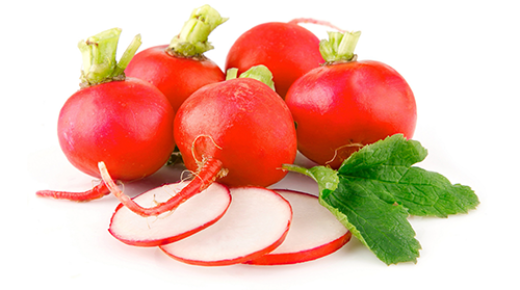2. RADISH

Radishes are members of the Brassicaceae family, which also includes mustard and
cabbage. The root of the radish is related to e.g. kale, broccoli, cauliflower and horseradish. Radishes are a great source of fibre, vitamin C and B6, minerals zinc, riboflavin, potassium, copper, magnesium, manganese and calcium. In ancient times they were used to treat stomach disorders, jaundice, urinary infections, ulcers, and more.
Health benefits of radishes
• Help to loosen phlegm and clear the sinuses
• Alleviate digestive distress and regulates the bowels
• Protect against cancer
They contain glucosinolates that inhibit cancer cell growth and induce apoptosis (cell death) of cancer cell lines.
• Prevent viral infections
They are an excellent source of vitamin C and zinc, both of which help strengthen the immune system.
• Help purge toxins from the liver, gallbladder, stomach, and colon
Phyto-chemicals in radishes like indoles and powerful flavonoids like zeaxanthin, lutein, and beta-carotene are all helpful detoxifying agents that help purge toxins from the liver, gallbladder, stomach, and colon.
• Reduce Inflammation
They contain a unique molecule called indol-3-carbinol (13C), which is common amongst the cruciferous family. This molecule helps reduce inflammatory intermediates in the blood, which normally cause inflammatory symptoms at the site of infection or injury. Thus, they help soothe rashes and skin disorders (acne, dermatitis, psoriasis, etc.) and reduce pain and swelling.
• Cardiovascular support
They contain a significant amount of potassium that helps balance fluid in the body by eliminating excess sodium via their diuretic effects thus lowering high blood pressure. Compounds in radishes called anthocyanins also help inhibit red blood cell damage by supplying fresh oxygen to the blood and therefore prevent cardiovascular disease.
• Kidney support
Acting as a natural diuretic, radishes help purify the kidney and urinary systems, and also help halt any burning sensations experienced during urination. They help prevent infections in the kidneys, too, and can treat many different urinary conditions that are triggered by excess toxins in the body.
• Prevent respiratory problems
Thanks to their anti-inflammatory effects and mucus-clearing benefits, radishes are a wonder food for relieving congestion and sinus issues and preventing problems linked with asthma and bronchitis.
• Help treat jaundice
Radishes contain enzymes like esterase, amylase, diastase, and myrosinase, which stimulate bile production and regulate bilirubin production. Too much bilirubin will trigger a yellow tinge in the skin, a type of jaundice caused by the liver not being able to break down bile production faster than it is being produced. Radishes also help reduce red blood cell damage, which is common among those suffering from jaundice.